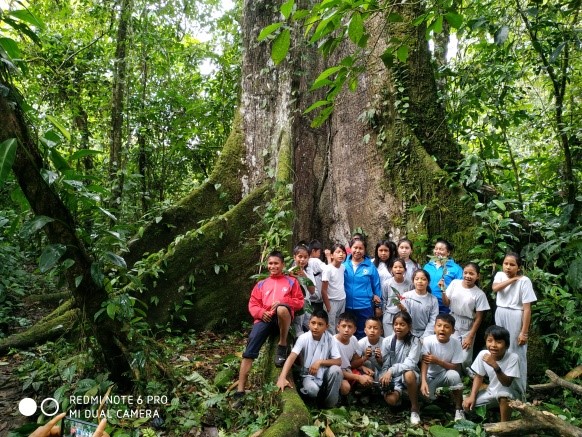For a number of years now, the Yves Rocher Foundation has been working closely to reforest with local NGOs in several Ecuadorian regions.
Raising awareness of crop diversification with Ishpingo

In the province of Napo, over half the working population works in the primary sector, with ancestral and sustainable crops. But gradually, endemic species have given way to monoculture in which high economic value species are over-exploited. This has led to a loss of local biodiversity, among other things. The French-Ecuadorian association Ishpingo has been working with local communities since 2006, leading an agroforestry project to improve standards of living for local people while preserving biodiversity in this part of the Amazon rainforest.
The project
Ishpingo’s main objective is to improve standards of living for local people and empower them to be financially self-sufficient. Together with Ishpingo, we are raising local awareness of the consequences of deforestation. By training farmers in agroforestry, we have deepened their understanding of the benefits of crop diversification.
The project is underpinned by the goal of planting 40,000 trees (fruit trees and timber) between 2018 and 2021:
- five nurseries were set up to meet the reforestation project’s needs, creating three jobs in the process.
- 45% of the fruit species reintroduced are native to the Amazon.
Today, over 55 hectares of trees have been planted so that dozens of Kichwa families can continue to live peacefully and sustainably. The impact that deforestation and monoculture has had on their daily lives is gradually being mitigated.
The Yves Rocher Foundation continues to support Ishpingo. Between 2021 and 2024, we aim to plant 60,000 more trees together. That’s 100,000 trees in total!

A few words about the NGO

Aware of the challenges facing the people of the Amazon, Flore and Antoine believe that it’s no longer enough to reflect. We have to act! Ishpingo was born in 2005. Flore and Antoine’s goal is a straightforward one: to set up a sustainable development model. Farmers get working themselves to reforest their land with native species, all with a view to empowering them and sharing knowledge. The plantations here are of the highest possible quality, and offer three knock-on effects: self-sufficiency, increased income from sales of the produce grown, and CO2 storage.
And there’s more...
Since September 2019, four schools have been set up with an environmental education project in place, giving pupils the opportunity to create and supply nurseries.
Find out more about the project with Ishpingo:https://ishpingo.org/
Accion Andina

In South America, the Andes region is subject to major deforestation. Polylepis is an endemic species in South America, and is found more precisely in the Andes. It is central to the Andean mountain forests and is home to a rare ecosystem. It is renowned for the role it plays in supporting life in streams and wetlands in the Andes. As a result, it provides water to local communities and even large Latin American cities.
Local communities in the Andes are becoming increasingly aware of the challenges of deforestation and the benefits of trees. They hope to take action to protect native species and need support in doing so. The Acción Andina project was launched in response to this by Global Forest Generation (GFG).
The project
Acción Andina was kick-started by GFG in 2018 and aims to restore forest landscapes. Over the next 25 years, the association plans to restore a million hectares of forest to save endangered local species and ensure food security for local people. This GFG project spans the countries bordering the Andes: Argentina, Bolivia, Chile, Colombia, Ecuador, Peru and Venezuela.
The project is structured around annual cycles:
- Seeds and plant collection from March to May,
- Planting from September to March.
The Andean people are motivated to protect and restore polylepis forests for their natural and cultural value.
The Yves Rocher Foundation supported a planting season in Ecuador, accounting for 112,000 trees in two nurseries.
Spotlight on Aves y Conservacion
Reforesting in mountainous regions in Ecuador. GFG decided to work with local partner Aves y Conservacion. The objectives are to rehydrate the region, mitigate climate change and restore natural habitats to foster biodiversity (spectacled bears and black-breasted pufflegs).
For maximum effectiveness, GFG and Aves y Conservacion focus on two forests in particular: Mindo and the Cayambe-Cova reserve, identified as favourable areas for bird conservation.
Two nurseries were built for this project. Nursery workers received training and are now skilled in growing tree seedlings. The income generated by the nurseries supports 10 families!
The Frontier of Life with Atayak

The Kichwa people of Sarayaku live in the Ecuadorian Amazon rainforest. The village’s locals depend on the resources offered up by the rainforest in their daily lives. But since the 1980s, multinational oil companies have been desperate to invest here, drilling deep into the precious Sarayaku soil on their search for potential oil.
After years of struggle, the Kichwa people succeeded in having the Ecuadorian government recognise the Kawsak Sacha declaration, a document that testifies to the forest as a living, conscious entity in its own right. The people of Sarayaku obtained the collective title deeds for 254,000 hectares of ancestral territories. The daily lives of 1,200 people will thus be preserved.
The project
The Kichwa people of Sarayaku live in the Ecuadorian Amazon rainforest. The village’s locals depend on the resources offered up by the rainforest in their daily lives. But since the 1980s, multinational oil companies have been desperate to invest here, drilling deep into the precious Sarayaku soil on their search for potential oil.
After years of struggle, the Kichwa people succeeded in having the Ecuadorian government recognise the Kawsak Sacha declaration, a document that testifies to the forest as a living, conscious entity in its own right. The people of Sarayaku obtained the collective title deeds for 254,000 hectares of ancestral territories. The daily lives of 1,200 people will thus be preserved.

Find out more about the project with Atayak: http://www.frontieredevie.net/www/wordpress/coordination-partenaires-du-projet


